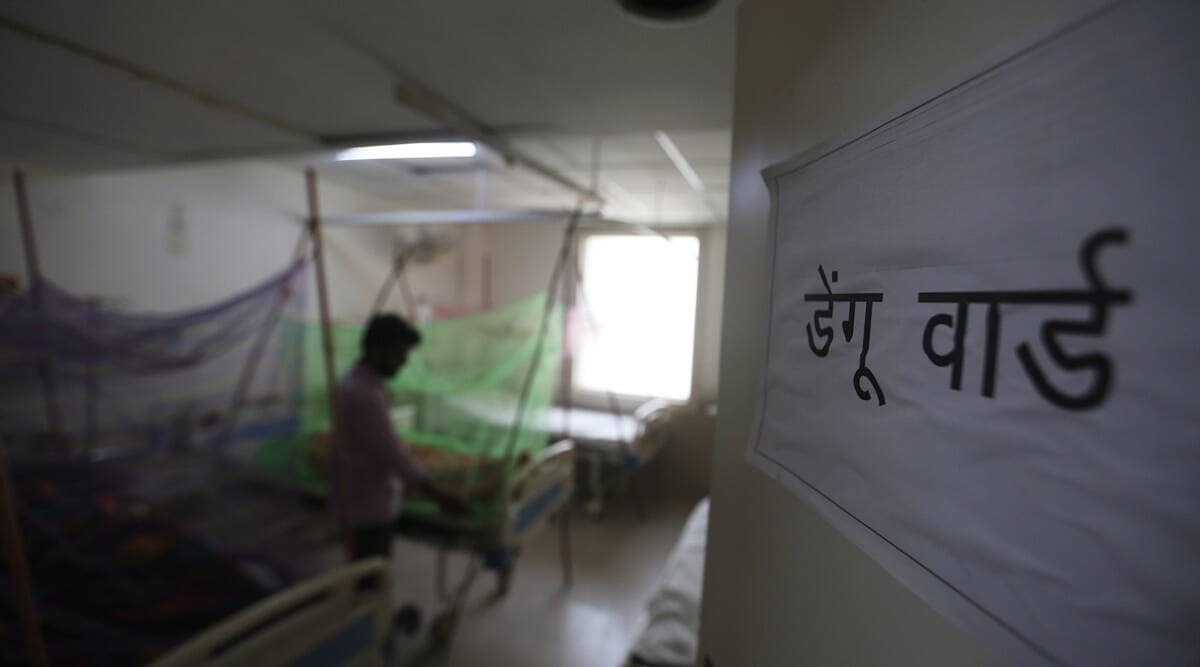 Seventy beds have been earmarked in Hindu Rao Hospital, 25 in Swami Dayanand and 75 in Kasturba Hospital. (Representational/ Express file photo)
Seventy beds have been earmarked in Hindu Rao Hospital, 25 in Swami Dayanand and 75 in Kasturba Hospital. (Representational/ Express file photo)Hospitals across Delhi are gearing up to deal with the rising dengue cases. Last week, 412 cases were reported in the capital – more than twice the figure recorded last year in September. Doctors, however, say the majority of cases are mild in nature and no hemorrhagic fever, like what was seen last year, has been reported.
Seven confirmed and eight suspected cases have been reported at the All India Institute of Medical Sciences (AIIMS).
Officials said patients have been admitted in the medicine department and are exhibiting mild to moderate symptoms.
At Safdarjung Hospital, 360 cases have been reported since the beginning of this year, including nine on Tuesday. The hospital has witnessed six fatalities this year so far.
Dr B L Sherwal, Medical Superintendent at the hospital, said they have enough stock for the apheresis facility and IgM kits if cases increase.
According to Dr Suranjit Chaterjee, senior consultant, internal medicine at Indraprastha Apollo Hospital, the numbers have gone up in the last week but the condition of patients is not serious. “In many patients, platelets went down but hemorrhagic fever was not there,” he said.
Dr Satish Koul, director, internal medicine at Fortis Memorial Research Institute said hemorrhagic fever is a fatal form of dengue fever wherein the patient suffers from shock. When a dengue patient becomes serious, he or she often has liver dysfunction, low blood pressure and multi-organ failure. “As of now, we have not seen any severe dengue hemorrhagic fever cases. The cases have been relatively normal and no surge has been witnessed,” he saod.
At Lok Nayak Hospital, six patients, including a minor, were admitted but showed mild symptoms, said Dr Suresh Kumar, the medical director.
He said there are no dedicated beds for dengue patients but 240 have been kept in the medicine ward. According to Dr Suresh, the numbers are expected to increase. “The cases are mild in nature but we need to be careful waterlogging doesn’t happen. Mosquito breeding should be checked and stopped, children should be made to wear full sleeves clothes,” said Dr Suresh.
At GTB hospital, while the administration has reserved beds, patients are going to Lok Nayak and only coming to GB Pant if they have other ailments as well or are referred from Lok Nayak.
“We have beds in case the need arises, and as per instructions of the state health department,” said medical director Dr Anil Agarwal.
Dr S K Arora, medical superintendent at Sanjay Gandhi Hospital, said two patients have been admitted and 11 beds have been kept aside.
“The two patients have been given mosquito nets and separate cubicles. We also have enough stock of blood banks in case of an emergency. We will increase the beds to 21 if more patients come in,” said Dr Arora.
Under the MCD, there are three surveillance hospitals where 300 dengue cases have been recorded this year.
Seventy beds have been earmarked in Hindu Rao Hospital, 25 in Swami Dayanand and 75 in Kasturba Hospital. “There is a round-the-clock lab, fever clinic and blood bank facility available as well,” said an MCD official.